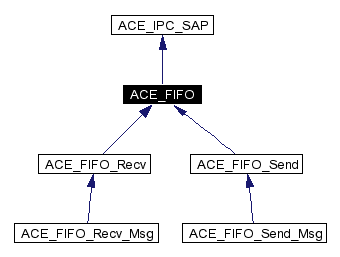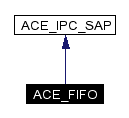
#include <FIFO.h>
Inheritance diagram for ACE_FIFO:


Public Methods | |
| int | open (const ACE_TCHAR *rendezvous, int flags, int perms, LPSECURITY_ATTRIBUTES sa=0) |
| int | close (void) |
| Close down the ACE_FIFO without removing the rendezvous point. | |
| int | remove (void) |
| int | get_local_addr (const ACE_TCHAR *&rendezvous) const |
| Return the local address of this endpoint. | |
| void | dump (void) const |
| Dump the state of an object. | |
Public Attributes | |
| ACE_ALLOC_HOOK_DECLARE | |
| Declare the dynamic allocation hooks. | |
Protected Methods | |
| ACE_FIFO (void) | |
| Default constructor. | |
| ACE_FIFO (const ACE_TCHAR *rendezvous, int flags, int perms, LPSECURITY_ATTRIBUTES sa=0) | |
Private Attributes | |
| ACE_TCHAR | rendezvous_ [MAXPATHLEN+1] |
| Rendezvous point in the file system. | |
UNIX FIFOs are also known Named Pipes, which are totally unrelated to Win32 Named Pipes. If you want to use a local IPC mechanism that will be portable to both UNIX and Win32, take a look at the <ACE_SPIPE_*> classes.
|
|
Default constructor.
|
|
||||||||||||||||||||
|
Open up the named pipe on the <rendezvous> in accordance with the flags. |
|
|
Close down the ACE_FIFO without removing the rendezvous point.
Reimplemented in ACE_FIFO_Recv. |
|
|
Dump the state of an object.
Reimplemented from ACE_IPC_SAP. Reimplemented in ACE_FIFO_Recv, ACE_FIFO_Recv_Msg, ACE_FIFO_Send, and ACE_FIFO_Send_Msg. |
|
|
Return the local address of this endpoint.
|
|
||||||||||||||||||||
|
Open up the named pipe on the <rendezvous> in accordance with the flags. Reimplemented in ACE_FIFO_Send, and ACE_FIFO_Send_Msg. |
|
|
Close down the ACE_FIFO and remove the rendezvous point from the file system. |
|
|
Declare the dynamic allocation hooks.
Reimplemented from ACE_IPC_SAP. Reimplemented in ACE_FIFO_Recv, ACE_FIFO_Recv_Msg, ACE_FIFO_Send, and ACE_FIFO_Send_Msg. |
|
|
Rendezvous point in the file system.
|
 1.2.18
1.2.18